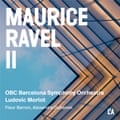The first disc of Ludovic Morlot’s Ravel gaze with the Barcelona orchestra of which he’s been tune director since 2022 regarded closing twelve months. That included two of Ravel’s best probably identified ratings: the suite Le Tombeau de Couperin and the ballet Mother Goose. On the coronary heart of this most modern instalment are Ravel’s three orchestral song cycles: the mezzo soprano Fleur Barron sings Shéhérazade, the 1904 settings of poems by Tristan Klingsor, and the 1913 Trois Poèmes de Stéphane Mallarmé, whereas between them the baritone Alexandre Duhamel is the soloist in the charming product of Ravel’s aged age, which used to be at the starting up supposed as a film score, Don Quichotte à Dulcinée, from 1933.

For all of the oriental beauty of Shéhérazade, delivered with suitably seductive heat by Barron, it’s the Mallarmé miniatures that shine most brightly right here, with Morlot fastidiously teasing out the instrumental strands of the accompanying ensemble, beautifully performed by the Barcelona soloists, to make a sparkling net around Barron’s lucid shaping of the vocal lines. Duhamel is equally meticulous in his presentation of the Quichotte numbers, even though he, and most certainly Morlot, too, every so frequently looks a tiny little bit of restrained when a tiny bit more earthiness will probably be appropriate.
The three sets of songs are framed by purely orchestral pieces, opening with the fanfare that Ravel nonetheless for the collective ballet for young of us L’Éventail de Jeanne, to which Roussel, Poulenc and Milhaud had been additionally amongst the contributors, and ending with Ravel’s occupy orchestrations of his Valses Nobles et Sentimentales, given a rather louche but totally appropriate edge by Morlot.
Circulation it on Apple Tune (above) or on Spotify
